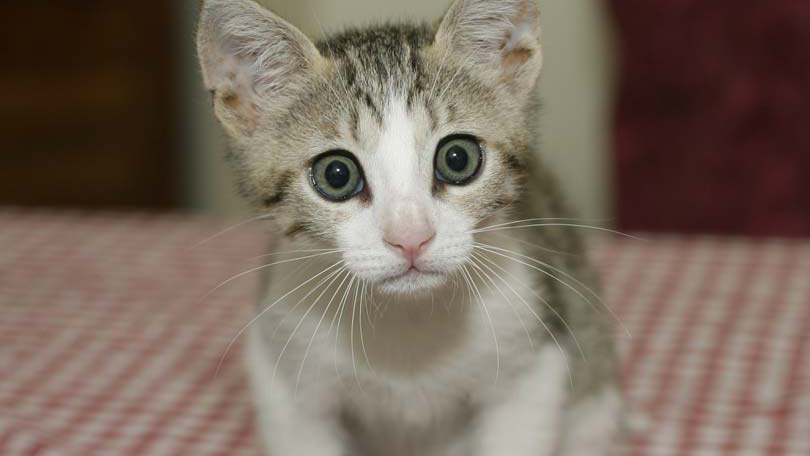Skittish Kittens
Skittish is a term to describe cats that are extremely fearful of humans. Skittish kittens run and hide as soon as humans come around. It is a behavior that starts when the cat is young and gets worse if the cat comes upon a mean human, such as a cranky neighbor who shoes the cat away with a broom or an owner who is abusive.
Normal cats have come to trust and understand humans—they understand the purpose of humans and the role that humans play in their environment. Skittish cats have a general distrust for humans. They look at people as giant monsters. Even if you are nice to this type of cat, it is unlikely to resolve this distrust. This may be where the term “scaredy cat” comes from.
Why Are Some Cats Skittish?
The main reason why a kitten will be skittish is because of lack of socialization with humans. If a kitten has no contact with humans over the first eight to 12 weeks of her life, there is a high likelihood that she will be skittish. This is a key period of time in a kitten’s young existence when she is getting used to the environment and all things in it. So if a kitten doesn’t ever see, bond with, or get fed by a human for the first three months of her life she is going to be extremely frightened when a human shows up out of nowhere.
Stray or feral kittens are most likely to be skittish, because their mothers teach them from birth and on to hide from and be afraid of humans. A feral mom will go to great lengths to find a hiding place to give birth and keep her kittens away from people and other threats. If you feed feral cats in your neighborhood, you may find that they run and hide until you put the food out, then come out and eat.
As mentioned earlier, some kittens are skittish because they were abused in the past by humans. This abuse at such a young age can cause irreparable damage to a cat in creating a semi-permanent distrust for all humans regardless of treatment, the same as what happens in some human children. Cats might also be skittish because they are afraid that the “human giants” in their environment will step on them accidentally. Finally, some kittens are skittish because they were chased or harassed. Maybe some neighborhood kids hounded the poor cat or used it as target practice.
How to “Fix” Skittish Kittens
In most cases, it doesn’t matter how you treat a skittish cat—it will run from you no matter what. You could raise a skittish cat from kittenhood and he will still run from you, his loving human owner, after years of ownership. But there are ways to reduce the anxiety in these cats.
For one, you cannot force the cat to come to you or like you. It is a gradual, slow process that can extend over the course of years. The best way to develop trust in a new, skittish kitten is to feed it good food regularly, at least three times a day on schedule, in its own special food bowl. This means so much to a young cat, especially if it came from the street where it had to fight and search through garbage cans for food.
Then, talk to the skittish kitten a lot. Even if it’s hiding under your bed, just go into the room, flip on the television on a low volume and talk to your kitten while she’s in hiding. You want her to get used to the sound of your voice and your presence.
Whenever your cat does come out of hiding, be ready with delicious treats. Drag a cord around on the floor (while sitting in a seat) to pique her interest and maybe get her to play.
Strange Behaviors
Skittish cats are strange, yet extremely amusing to observer when they are living in a household. Some will only come out at night when all of the humans are asleep. Others disappear into thin air as soon as guests show up.
Some cats are only afraid of people when they are standing up. It’s possible that the towering height of the human is what causes the fear. As long as the human is sitting or laying down these kittens will come up, play, and even sit on the lap of the human. However, as soon as the human stands or makes a sharp movement the cat bolts!
There are many skittish kittens who actually like to be chased. They do it for amusement. You can tell that this is the case when you walk after them, stop in your tracks, and then they stop and turn back to see where you are at. In this case, just chase them around playfully (not at full speed, just a light jog) to satisfy their need for fun. While you’re giving chase, the tone of your voice is very important—your tone should be playful and happy. “I’m going to get you!” in a cooing, high voice, like what you would say to a toddler, works very well.
In other cases, these “scaredy cats” will only run from you in certain situations. For example, when its feeding time they’ll stick around. Or if you have developed a ritual with the cat, such as time in the bathroom when you’re brushing your teeth or showering, the skittish cat won’t run.
Concerns
If your cat wasn’t skittish before, but all of a sudden starts hiding from you and other people, that could be a sign of a problem that needs to be resolved. When cats aren’t feeling well they hide. This could also be because someone in the house (human or pet) is terrorizing your kitty. Young kids can be the worst natural enemies to cats—they pull at cats’ tails and can hurt them badly without even realizing it. Keep your feelers up (even if you have to install a nanny cam in your home).
You skittish kitten might be that way for life, but that doesn’t mean he or she is any less of a joy to own. Your job as the owner is not to convert a cat into a perfect ideal of what is considered “normal.” Sometimes good things come in strange packages. All you have to do as the owner is assure that your cat is safe, secure, healthy, and happy.

Having discovered a fondness for insects while pursuing her degree in Biology, Randi Jones was quite bugged to know that people usually dismissed these little creatures as “creepy-crawlies”.







